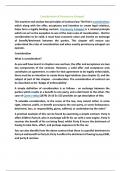Lecture notes
Contract Law-Consideration & Promissory Estoppel(LLB, Exam plans)
- Module
- Contract Law
- Institution
- University Of Oxford
These meticulously curated notes delves into the intricate concepts of Consideration and Promissory Estoppel under UK Contract Law. Consideration is a foundational element required for a contract to be enforceable, representing the value exchanged between parties—whether it be money, services, or...
[Show more]



